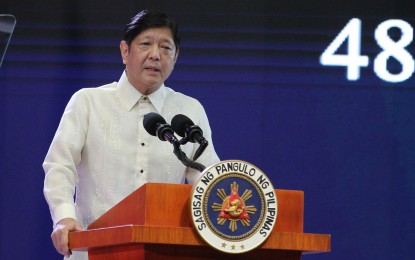
President Ferdinand R. Marcos Jr. (PNA photo by Joey Razon)
MANILA – President Ferdinand R. Marcos Jr. has ordered the continued distribution of emergency subsidies to help Filipinos cope with the impact of inflationary pressures, Malacañang said Friday.
"President Ferdinand R. Marcos Jr. has directed the continuation of support to the most vulnerable sectors in the form of distribution of cash transfers and fuel discounts to help cushion the impact of rising inflation," Undersecretary Cheloy Garafil, officer-in-charge of the Office of the Press Secretary (OPS), said in a press statement.
The statement came after the Philippine Statistics Authority (PSA) reported that the country’s headline inflation accelerated to 7.7 percent in October 2022, higher than the 6.9 percent reported in September the same year.
Garafil said the latest inflation rate, while higher by 0.8 percent from September’s figure, remains within the Bangko Sentral ng Pilipinas forecast range of 7.1 to 7.9 percent for October.
Citing the report from the National Economic and Development Authority (NEDA), Garafil attributed the surge in prices of basic goods and services to external pressures such as the Russia-Ukraine war, fiscal instability due to the Covid-19 pandemic, and the impact of recent tropical cyclones.
READ: October inflation climbs to 7.7%
Garafil said the government remains vigilant in monitoring the prices of basic commodities and inflationary pressures.
"We assure the public that the government continues to monitor inflation and all contributing factors, and will explore all other measures to alleviate its impact on our people," she said.
She also ensured that various government interventions are in place to ease inflation.
Considering the damage to property and livelihood caused by the recent typhoons, Marcos vowed to support farmers and other agricultural stakeholders in post-disaster recovery, Garafil said.
Garafil noted that improving the value chain and investing in "climate-smart" technologies remain a priority of the President "in the medium and long-term."
To mitigate water-induced damages to lives, livelihood and property, Marcos would also prioritize the "effective" management of the country's water resources by pushing for the establishment of the proposed Department of Water Resources, Garafil said.
"This will be part of government’s key response to rising inflation even as we continue to build on climate action and food security," she said.
"The President has also directed concerned agencies to invest in innovations and technologies to make our communities and businesses resilient amid extreme weather challenges," Garafil added.
The continued uptrend in inflation in October was driven by faster inflation rate in key commodity groups, particularly food and non-alcoholic beverages, which increased to 9.4 percent from 7.4 percent in September 2022.
Among the top contributors to October 2022 inflation are meat, fish, and vegetable (1.7 percent); electricity, gas, and other fuels (1.1 percent); operation of personal transport (0.6 percent); food and beverage services (0.5 percent); passenger transport services (0.5 percent); and housing rentals (0.5 percent).
In a separate statement, Socioeconomic Planning Secretary and NEDA Director General Arsenio Balisacan said providing assistance to those who belong to the vulnerable sector will alleviate the effects of the sustained increase in commodity prices. (PNA)
